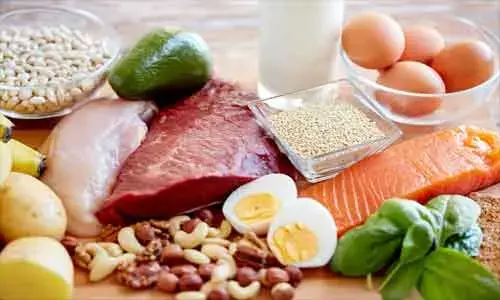- Home
- Medical news & Guidelines
- Anesthesiology
- Cardiology and CTVS
- Critical Care
- Dentistry
- Dermatology
- Diabetes and Endocrinology
- ENT
- Gastroenterology
- Medicine
- Nephrology
- Neurology
- Obstretics-Gynaecology
- Oncology
- Ophthalmology
- Orthopaedics
- Pediatrics-Neonatology
- Psychiatry
- Pulmonology
- Radiology
- Surgery
- Urology
- Laboratory Medicine
- Diet
- Nursing
- Paramedical
- Physiotherapy
- Health news
- Fact Check
- Bone Health Fact Check
- Brain Health Fact Check
- Cancer Related Fact Check
- Child Care Fact Check
- Dental and oral health fact check
- Diabetes and metabolic health fact check
- Diet and Nutrition Fact Check
- Eye and ENT Care Fact Check
- Fitness fact check
- Gut health fact check
- Heart health fact check
- Kidney health fact check
- Medical education fact check
- Men's health fact check
- Respiratory fact check
- Skin and hair care fact check
- Vaccine and Immunization fact check
- Women's health fact check
- AYUSH
- State News
- Andaman and Nicobar Islands
- Andhra Pradesh
- Arunachal Pradesh
- Assam
- Bihar
- Chandigarh
- Chattisgarh
- Dadra and Nagar Haveli
- Daman and Diu
- Delhi
- Goa
- Gujarat
- Haryana
- Himachal Pradesh
- Jammu & Kashmir
- Jharkhand
- Karnataka
- Kerala
- Ladakh
- Lakshadweep
- Madhya Pradesh
- Maharashtra
- Manipur
- Meghalaya
- Mizoram
- Nagaland
- Odisha
- Puducherry
- Punjab
- Rajasthan
- Sikkim
- Tamil Nadu
- Telangana
- Tripura
- Uttar Pradesh
- Uttrakhand
- West Bengal
- Medical Education
- Industry
Low protein intake linked with poor muscle recovery post kidney transplantation: Study

In kidney transplant recipients (KTRs), inadequate protein intake had a negative impact on recovering from skeletal muscle mass loss following kidney transplantation (KT), says an article published in Clinical Nutrition.
Patients with chronic kidney disease, particularly those receiving dialysis for end-stage renal disease, have a loss of skeletal muscle mass. On the other side, skeletal muscle loss is improved by the restoration of renal function brought on by a successful kidney transplant. Low protein consumption, however, could affect how post-KT skeletal muscle mass evolves. This study was carried out by Akihiro Kosoku and colleagues to investigate the relationship between changes in skeletal muscle mass and protein consumption in kidney transplant patients (KTRs).
A cohort research including KTRs and live kidney donors was carried out (LKDs). Bioelectrical impedance analysis was used to evaluate the skeletal muscle mass index (SMI) prior to KT as well as one and twelve months thereafter. At 12 months following KT, protein consumption was determined using 24-hour urine urea nitrogen using the Maroni method. Researchers used a multivariable regression analysis adjusted for factors such age, sex, cumulative glucocorticoids, diabetes mellitus, cumulative hospitalization, and SMI before KT to assess the relationship between protein consumption and the changes in SMI during the first year after KT.
The key findings of this study were:
1. The median SMI in KTRs (n = 64) was 7.26 kg/m2 before KT, 7.01 kg/m2 at one month after KT, and 7.55 kg/m2 at twelve months after KT.
2. The median SMI in LKDs (n = 17) was 6.24 kg/m2 prior to KT, increased to 6.40 kg/m2 one month later, and climbed again to 6.95 kg/m2 twelve months afterwards.
3. After correction, the changes in SMI throughout the course of the first year following KT showed a significant connection with protein consumption (p = 0.015).
4. Using the multivariable non-linear regression model, the projected value of protein intake in KTRs, whose values of SMI before KT and at 12 months after KT were the same, was 0.72 g/kg ideal body weight (IBW)/day.
Reference:
Kosoku, A., Iwai, T., Ishihara, T., Kabei, K., Nishide, S., Maeda, K., Hanayama, Y., Ishimura, E., & Uchida, J. (2022). Influence of protein intake on the changes in skeletal muscle mass after kidney transplantation. In Clinical Nutrition (Vol. 41, Issue 9, pp. 1881–1888). Elsevier BV. https://doi.org/10.1016/j.clnu.2022.07.028
Neuroscience Masters graduate
Jacinthlyn Sylvia, a Neuroscience Master's graduate from Chennai has worked extensively in deciphering the neurobiology of cognition and motor control in aging. She also has spread-out exposure to Neurosurgery from her Bachelor’s. She is currently involved in active Neuro-Oncology research. She is an upcoming neuroscientist with a fiery passion for writing. Her news cover at Medical Dialogues feature recent discoveries and updates from the healthcare and biomedical research fields. She can be reached at editorial@medicaldialogues.in
Dr Kamal Kant Kohli-MBBS, DTCD- a chest specialist with more than 30 years of practice and a flair for writing clinical articles, Dr Kamal Kant Kohli joined Medical Dialogues as a Chief Editor of Medical News. Besides writing articles, as an editor, he proofreads and verifies all the medical content published on Medical Dialogues including those coming from journals, studies,medical conferences,guidelines etc. Email: drkohli@medicaldialogues.in. Contact no. 011-43720751


